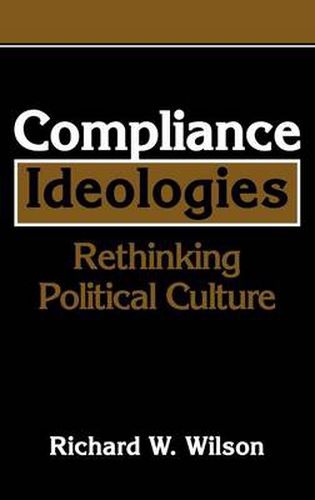Readings Newsletter
Become a Readings Member to make your shopping experience even easier.
Sign in or sign up for free!
You’re not far away from qualifying for FREE standard shipping within Australia
You’ve qualified for FREE standard shipping within Australia
The cart is loading…






This book is about political culture. It examines developments in the social sciences and integrates them into a theoretical explanation of historical changes in political values. The starting point is the premise that political culture is rooted in the interaction between individual thinking and social norms. Individual reasoning develops according to Piagetian principles. Conceptions of social life reflect the way thought is organized; they are expressed, however, through sumbolic forms constructed from prevailing cultural orientations. Social norms reflect the reasoning capability of society’s members but are not organized conceptually symbolic in the same manner. They also serve institutional purposes by providing moral justifications, comprehensible to all of society’s members, for inequality and solidarity. Institutional effeciency is enhanced when status arrangements are considered legitimate. Moral criteria that justify compliance thus serve to reduce friction in, and hence the costs of, organized activity. Moral justifications, however, as an aspect of cultural orientations in general, may be challenged following technological innovation that alters institutional arrangements. In the turmoil that accompanies change new moral guideposts are debated. Through discourse, individual conceptions of social life are transformed and, interactively, social norms and cultural orientations as well.
$9.00 standard shipping within Australia
FREE standard shipping within Australia for orders over $100.00
Express & International shipping calculated at checkout
Stock availability can be subject to change without notice. We recommend calling the shop or contacting our online team to check availability of low stock items. Please see our Shopping Online page for more details.
This book is about political culture. It examines developments in the social sciences and integrates them into a theoretical explanation of historical changes in political values. The starting point is the premise that political culture is rooted in the interaction between individual thinking and social norms. Individual reasoning develops according to Piagetian principles. Conceptions of social life reflect the way thought is organized; they are expressed, however, through sumbolic forms constructed from prevailing cultural orientations. Social norms reflect the reasoning capability of society’s members but are not organized conceptually symbolic in the same manner. They also serve institutional purposes by providing moral justifications, comprehensible to all of society’s members, for inequality and solidarity. Institutional effeciency is enhanced when status arrangements are considered legitimate. Moral criteria that justify compliance thus serve to reduce friction in, and hence the costs of, organized activity. Moral justifications, however, as an aspect of cultural orientations in general, may be challenged following technological innovation that alters institutional arrangements. In the turmoil that accompanies change new moral guideposts are debated. Through discourse, individual conceptions of social life are transformed and, interactively, social norms and cultural orientations as well.